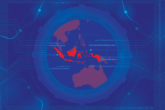October 27, 2025
Losing the Swing States
This article was originally published in Foreign Affairs.
In the battle to shape the global order, the BRICS—a ten-country group, which is named for its first five members (Brazil, Russia, India, China, and South Africa)—has become increasingly important. The bloc represents roughly a third of global GDP and nearly half the world’s population. It exists to give countries that belong to the so-called global South more sway on the world stage.
That might make the BRICS seem like an inherently anti-Western group. It was, after all, founded in part by Beijing and Moscow. But for most of its 16-year history, the BRICS has not positioned itself in opposition to the United States and its allies. Several BRICS members have even been close U.S. partners. Washington has built a strong trade relationship with Brazil, for instance, and cooperates with India and Indonesia on matters of defense.
The United States has strained its relations with friendly BRICS members.
But much of that picture now appears to be changing. Over the past decade, China and Russia have ramped up their efforts to steer their fellow BRICS members toward a worldview contrary to Washington’s interests. China has become Brazil’s top trade partner and supports the country’s efforts to reduce its dependence on the U.S. dollar. Russia has been selling massive amounts of oil to India. And both China and Russia have courted South Africa as a partner in resisting what Russian President Vladimir Putin has described as the “colonialism” of the U.S.-led order. Meanwhile, the United States has strained its relations with friendly BRICS members. The U.S.-Indian relationship has not been this chilly since 1998, when the United States sanctioned it for testing nuclear weapons. In September, Deputy Secretary of State Chris Landau said that the U.S.-Brazilian relationship was at its “darkest point in two centuries.” And ties with South Africa are the most tenuous they’ve been since the end of apartheid in 1994.
The causes of the deterioration are different in each case, and some of Washington’s grievances against Brazil, India, and South Africa—global swing states that will help dictate which country leads the world—are legitimate. But in each instance, the Trump administration has made relations significantly worse than they should be, and for reasons hard to square with U.S. national interests. As a result, there is a new risk on the horizon: the emergence of the BRICS as a more active, anti-Western bloc that is increasingly dominated by China and Russia. Unless the United States changes policy in the short term, it will pay for this realignment in the long term.
Read the full article on Foreign Affairs.
More from CNAS
-
How the U.S. and South Africa Could Use the G20 to Plot a Path Forward
In the contest for the future of global order, South Africa’s choices will have a disproportionate impact on the outcome....
By Richard Fontaine & Gibbs McKinley
-
Global Swing States and the New Great Power Competition
International politics is undergoing a period of rapid, significant change. China and Russia are working together more closely and alongside Iran and North Korea...
By Richard Fontaine & Gibbs McKinley
-
Technology & National Security
Countering the Digital Silk Road: BrazilProject Overview This year marks the 10th anniversary of the Digital Silk Road (DSR), China’s ambitious initiative to shape critical digital infrastructure around the world to...
By Ruby Scanlon & Bill Drexel
-
Technology & National Security
Countering the Digital Silk Road: IndonesiaThis year marks the 10th anniversary of the Digital Silk Road (DSR), China’s ambitious initiative to shape critical digital infrastructure around the world to advance its geop...
By Vivek Chilukuri & Ruby Scanlon




